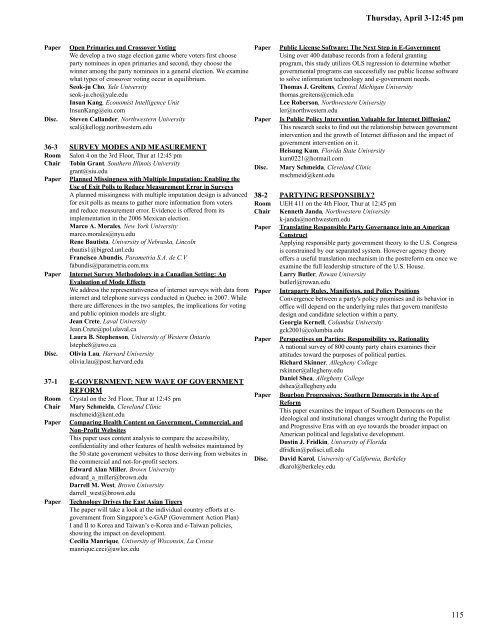2008 Conference Program - Midwest Political Science Association
2008 Conference Program - Midwest Political Science Association
2008 Conference Program - Midwest Political Science Association
You also want an ePaper? Increase the reach of your titles
YUMPU automatically turns print PDFs into web optimized ePapers that Google loves.
Thursday, April 3-12:45 pm<br />
Paper<br />
Disc.<br />
Open Primaries and Crossover Voting<br />
We develop a two stage election game where voters first choose<br />
party nominees in open primaries and second, they choose the<br />
winner among the party nominees in a general election. We examine<br />
what types of crossover voting occur in equilibrium.<br />
Seok-ju Cho, Yale University<br />
seok-ju.cho@yale.edu<br />
Insun Kang, Economist Intelligence Unit<br />
InsunKang@eiu.com<br />
Steven Callander, Northwestern University<br />
scal@kellogg.northwestern.edu<br />
36-3 SURVEY MODES AND MEASUREMENT<br />
Room Salon 4 on the 3rd Floor, Thur at 12:45 pm<br />
Chair Tobin Grant, Southern Illinois University<br />
grant@siu.edu<br />
Paper Planned Missingness with Multiple Imputation: Enabling the<br />
Use of Exit Polls to Reduce Measurement Error in Surveys<br />
A planned missingness with multiple imputation design is advanced<br />
for exit polls as means to gather more information from voters<br />
and reduce measurement error. Evidence is offered from its<br />
implementation in the 2006 Mexican election.<br />
Marco A. Morales, New York University<br />
marco.morales@nyu.edu<br />
Rene Bautista, University of Nebraska, Lincoln<br />
rbautis1@bigred.unl.edu<br />
Francisco Abundis, Parametria S.A. de C.V<br />
fabundis@parametria.com.mx<br />
Paper Internet Survey Methodology in a Canadian Setting: An<br />
Evaluation of Mode Effects<br />
We address the representativeness of internet surveys with data from<br />
internet and telephone surveys conducted in Quebec in 2007. While<br />
there are differences in the two samples, the implications for voting<br />
and public opinion models are slight.<br />
Jean Crete, Laval University<br />
Jean.Crete@pol.ulaval.ca<br />
Laura B. Stephenson, University of Western Ontario<br />
lstephe8@uwo.ca<br />
Disc. Olivia Lau, Harvard University<br />
olivia.lau@post.harvard.edu<br />
37-1 E-GOVERNMENT: NEW WAVE OF GOVERNMENT<br />
REFORM<br />
Room Crystal on the 3rd Floor, Thur at 12:45 pm<br />
Chair Mary Schmeida, Cleveland Clinic<br />
mschmeid@kent.edu<br />
Paper Comparing Health Content on Government, Commercial, and<br />
Non-Profit Websites<br />
This paper uses content analysis to compare the accessibility,<br />
confidentiality and other features of health websites maintained by<br />
the 50 state government websites to those deriving from websites in<br />
the commercial and not-for-profit sectors.<br />
Edward Alan Miller, Brown University<br />
edward_a_miller@brown.edu<br />
Darrell M. West, Brown University<br />
darrell_west@brown.edu<br />
Paper Technology Drives the East Asian Tigers<br />
The paper will take a look at the individual country efforts at e-<br />
government from Singapore’s e-GAP (Government Action Plan)<br />
I and II to Korea and Taiwan’s e-Korea and e-Taiwan policies,<br />
showing the impact on development.<br />
Cecilia Manrique, University of Wisconsin, La Crosse<br />
manrique.ceci@uwlax.edu<br />
Paper<br />
Paper<br />
Disc.<br />
Public License Software: The Next Step in E-Government<br />
Using over 400 database records from a federal granting<br />
program, this study utilizes OLS regression to determine whether<br />
governmental programs can successfully use public license software<br />
to solve information technology and e-government needs.<br />
Thomas J. Greitens, Central Michigan University<br />
thomas.greitens@cmich.edu<br />
Lee Roberson, Northwestern University<br />
ler@northwestern.edu<br />
Is Public Policy Intervention Valuable for Internet Diffusion<br />
This research seeks to find out the relationship between government<br />
intervention and the growth of Internet diffusion and the impact of<br />
government intervention on it.<br />
Heisung Kum, Florida State University<br />
kum0221@hotmail.com<br />
Mary Schmeida, Cleveland Clinic<br />
mschmeid@kent.edu<br />
38-2 PARTYING RESPONSIBLY<br />
Room UEH 411 on the 4th Floor, Thur at 12:45 pm<br />
Chair Kenneth Janda, Northwestern University<br />
k-janda@northwestern.edu<br />
Paper Translating Responsible Party Governance into an American<br />
Construct<br />
Applying responsible party government theory to the U.S. Congress<br />
is constrained by our separated system. However agency theory<br />
offers a useful translation mechanism in the postreform era once we<br />
examine the full leadership structure of the U.S. House.<br />
Larry Butler, Rowan University<br />
butlerl@rowan.edu<br />
Paper Intraparty Rules, Manifestos, and Policy Positions<br />
Convergence between a party's policy promises and its behavior in<br />
office will depend on the underlying rules that govern manifesto<br />
design and candidate selection within a party.<br />
Georgia Kernell, Columbia University<br />
gck2001@columbia.edu<br />
Paper Perspectives on Parties: Responsibility vs. Rationality<br />
A national survey of 800 county party chairs examines their<br />
attitudes toward the purposes of political parties.<br />
Richard Skinner, Allegheny College<br />
rskinner@allegheny.edu<br />
Daniel Shea, Allegheny College<br />
dshea@allegheny.edu<br />
Paper Bourbon Progressives: Southern Democrats in the Age of<br />
Reform<br />
This paper examines the impact of Southern Democrats on the<br />
ideological and institutional changes wrought during the Populist<br />
and Progressive Eras with an eye towards the broader impact on<br />
American political and legislative development.<br />
Dustin J. Fridkin, University of Florida<br />
dfridkin@polisci.ufl.edu<br />
Disc. David Karol, University of California, Berkeley<br />
dkarol@berkeley.edu<br />
115










